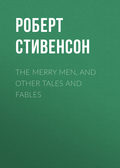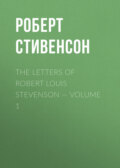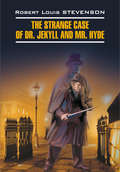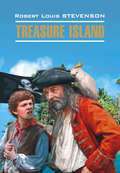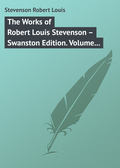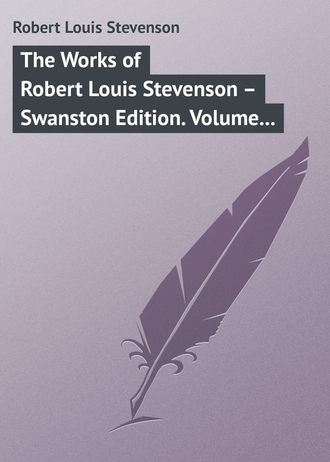
Роберт Льюис Стивенсон
The Works of Robert Louis Stevenson – Swanston Edition. Volume 6
By the first glimpse of day the party sallied forth from the fireside into the street. The wind had fallen, but still charioted a world of troubled clouds; the air bit like frost; and the party, as they stood about the ruins in the rainy twilight of the morning, beat upon their breasts and blew into their hands for warmth. The house had entirely fallen, the walls outward, the roof in; it was a mere heap of rubbish, with here and there a forlorn spear of broken rafter. A sentinel was placed over the ruins to protect the property, and the party adjourned to Tentaillon’s to break their fast at the Doctor’s expense. The bottle circulated somewhat freely; and before they left the table it had begun to snow.
For three days the snow continued to fall, and the ruins, covered with tarpaulin and watched by sentries, were left undisturbed. The Desprez meanwhile had taken up their abode at Tentaillon’s. Madame spent her time in the kitchen, concocting little delicacies, with the admiring aid of Madame Tentaillon, or sitting by the fire in thoughtful abstraction. The fall of the house affected her wonderfully little; that blow had been parried by another; and in her mind she was continually fighting over again the battle of the trousers. Had she done right? Had she done wrong? And now she would applaud her determination; and anon, with a horrid flush of unavailing penitence, she would regret the trousers. No juncture in her life had so much exercised her judgment. In the meantime the Doctor had become vastly pleased with his situation. Two of the summer boarders still lingered behind the rest, prisoners for lack of a remittance; they were both English, but one of them spoke French pretty fluently, and was, besides, a humorous, agile-minded fellow, with whom the Doctor could reason by the hour, secure of comprehension. Many were the glasses they emptied, many the topics they discussed.
“Anastasie,” the Doctor said on the third morning, “take an example from your husband, from Jean-Marie! The excitement has done more for the boy than all my tonics, he takes his turn as sentry with positive gusto. As for me, you behold me. I have made friends with the Egyptians; and my Pharaoh is, I swear it, a most agreeable companion. You alone are hipped. About a house – a few dresses? What are they in comparison to the ‘Pharmacopœia’ – the labour of years lying buried below stones and sticks in this depressing hamlet? The snow falls; I shake it from my cloak! Imitate me. Our income will be impaired, I grant it, since we must rebuild; but moderation, patience, and philosophy will gather about the hearth. In the meanwhile, the Tentaillons are obliging; the table, with your additions, will pass; only the wine is execrable – well, I shall send for some to-day. My Pharaoh will be gratified to drink a decent glass; aha! and I shall see if he possesses that acme of organisation – a palate. If he has a palate, he is perfect.”
“Henri,” she said, shaking her head, “you are a man; you cannot understand my feelings; no woman could shake off the memory of so public a humiliation.”
The Doctor could not restrain a titter. “Pardon me, darling,” he said; “but really, to the philosophical intelligence, the incident appears so small a trifle. You looked extremely well – ”
“Henri!” she cried.
“Well, well, I will say no more,” he replied. “Though, to be sure, if you had consented to indue —À propos,” he broke off, “and my trousers! They are lying in the snow – my favourite trousers!” And he dashed in quest of Jean-Marie.
Two hours afterwards the boy returned to the inn with a spade under one arm and a curious sop of clothing under the other.
The Doctor ruefully took it in his hands. “They have been!” he said. “Their tense is past. Excellent pantaloons, you are no more! Stay, something in the pocket,” and he produced a piece of paper. “A letter! ay, now I mind me; it was received on the morning of the gale, when I was absorbed in delicate investigations. It is still legible. From poor dear Casimir! It is as well,” he chuckled, “that I have educated him to patience. Poor Casimir and his correspondence – his infinitesimal, timorous, idiotic correspondence!”
He had by this time cautiously unfolded the wet letter; but, as he bent himself to decipher the writing, a cloud descended on his brow.
“Bigre!” he cried, with a galvanic start.
And then the letter was whipped into the fire, and the Doctor’s cap was on his head in the turn of a hand.
“Ten minutes! I can catch it, if I run,” he cried. “It is always late. I go to Paris. I shall telegraph.”
“Henri! what is wrong?” cried his wife.
“Ottoman Bonds!” came from the disappearing Doctor; and Anastasie and Jean-Marie were left face to face with the wet trousers. Desprez had gone to Paris, for the second time in seven years; he had gone to Paris with a pair of wooden shoes, a knitted spencer, a black blouse, a country nightcap, and twenty francs in his pocket. The fall of the house was but a secondary marvel; the whole world might have fallen and scarce left his family more petrified.
CHAPTER VIII
THE WAGES OF PHILOSOPHY
On the morning of the next day, the Doctor, a mere spectre of himself, was brought back in the custody of Casimir. They found Anastasie and the boy sitting together by the fire; and Desprez, who had exchanged his toilette for a ready-made rig-out of poor materials, waved his hand as he entered, and sank speechless on the nearest chair. Madame turned direct to Casimir.
“What is wrong?” she cried.
“Well,” replied Casimir, “what have I told you all along? It has come. It is a clean shave this time; so you may as well bear up and make the best of it. House down, too, eh? Bad luck, upon my soul!”
“Are we – are we – ruined?” she gasped.
The Doctor stretched out his arms to her. “Ruined,” he replied, “you are ruined by your sinister husband.”
Casimir observed the consequent embrace through his eyeglass; then he turned to Jean-Marie. “You hear?” he said. “They are ruined; no more pickings, no more house, no more fat cutlets. It strikes me, my friend, that you had best be packing; the present speculation is about worked out.” And he nodded to him meaningly.
“Never!” cried Desprez, springing up. “Jean-Marie, if you prefer to leave me, now that I am poor, you can go; you shall receive your hundred francs, if so much remains to me. But if you will consent to stay” – the Doctor wept a little – “Casimir offers me a place – as clerk,” he resumed. “The emoluments are slender, but they will be enough for three. It is too much already to have lost my fortune; must I lose my son?”
Jean-Marie sobbed bitterly, but without a word.
“I don’t like boys who cry,” observed Casimir. “This one is always crying. – Here! you clear out of this for a little; I have business with your master and mistress, and these domestic feelings may be settled after I am gone. March!” and he held the door open.
Jean-Marie slunk out, like a detected thief.
By twelve they were all at table but Jean-Marie.
“Hey?” said Casimir. “Gone, you see. Took the hint at once.”
“I do not, I confess,” said Desprez, “I do not seek to excuse his absence. It speaks a want of heart that disappoints me sorely.”
“Want of manners,” corrected Casimir. “Heart he never had. Why, Desprez, for a clever fellow, you are the most gullible mortal in creation. Your ignorance of human nature and human business is beyond belief. You are swindled by heathen Turks, swindled by vagabond children, swindled right and left, upstairs and downstairs. I think it must be your imagination. I thank my stars I have none.”
“Pardon me,” replied Desprez, still humbly, but with a return of spirit at sight of a distinction to be drawn; “pardon me, Casimir. You possess, even to an eminent degree, the commercial imagination. It was the lack of that in me – it appears it is my weak point – that has led to these repeated shocks. By the commercial imagination the financier forecasts the destiny of his investments, marks the falling house – ”
“Egad,” interrupted Casimir: “our friend the stable-boy appears to have his share of it.”
The Doctor was silenced; and the meal was continued and finished principally to the tune of the brother-in-law’s not very consolatory conversation. He entirely ignored the two young English painters, turning a blind eyeglass to their salutations, and continuing his remarks as if he were alone in the bosom of his family; and with every second word he ripped another stitch out of the air-balloon of Desprez’ vanity. By the time coffee was over the poor Doctor was as limp as a napkin.
“Let us go and see the ruins,” said Casimir.
They strolled forth into the street. The fall of the house, like the loss of a front tooth, had quite transformed the village. Through the gap the eye commanded a great stretch of open snowy country, and the place shrank in comparison. It was like a room with an open door. The sentinel stood by the green gate, looking very red and cold, but he had a pleasant word for the Doctor and his wealthy kinsman.
Casimir looked at the mound of ruins, he tried the quality of the tarpaulin. “H’m,” he said, “I hope the cellar arch has stood. If it has, my good brother, I will give you a good price for the wines.”
“We shall start digging to-morrow,” said the sentry. “There is no more fear of snow.”
“My friend,” returned Casimir sententiously, “you had better wait till you get paid.”
The Doctor winced, and began dragging his offensive brother-in-law towards Tentaillon’s. In the house there would be fewer auditors, and these already in the secret of his fall.
“Hullo!” cried Casimir, “there goes the stable-boy with his luggage; no, egad, he is taking it into the inn.”
And sure enough, Jean-Marie was seen to cross the snowy street and enter Tentaillon’s, staggering under a large hamper.
The Doctor stopped with a sudden, wild hope.
“What can he have?” he said. “Let us go and see.” And he hurried on.
“His luggage, to be sure,” answered Casimir. “He is on the move – thanks to the commercial imagination.”
“I have not seen that hamper for – for ever so long,” remarked the Doctor.
“Nor will you see it much longer,” chuckled Casimir, “unless, indeed, we interfere. And by the way, I insist on an examination.”
“You will not require,” said Desprez, positively with a sob; and, casting a moist, triumphant glance at Casimir, he began to run.
“What the devil is up with him, I wonder?” Casimir reflected; and then, curiosity taking the upper hand, he followed the Doctor’s example and took to his heels.
The hamper was so heavy and large, and Jean-Marie himself so little and so weary, that it had taken him a great while to bundle it upstairs to the Desprez’ private room; and he had just set it down on the floor in front of Anastasie, when the Doctor arrived, and was closely followed by the man of business. Boy and hamper were both in a most sorry plight; for the one had passed four months underground in a certain cave on the way to Achères, and the other had run about five miles as hard as his legs would carry him, half that distance under a staggering weight.
“Jean-Marie,” cried the Doctor, in a voice that was only too seraphic to be called hysterical, “is it – ? It is!” he cried. “Oh, my son, my son!” And he sat down upon the hamper and sobbed like a little child.
“You will not go to Paris now,” said Jean-Marie sheepishly.
“Casimir,” said Desprez, raising his wet face, “do you see that boy, that angel boy? He is the thief; he took the treasure from a man unfit to be entrusted with its use; he brings it back to me when I am sobered and humbled. These, Casimir, are the Fruits of my Teaching, and this moment is the Reward of my Life.”
“Tiens,” said Casimir.



